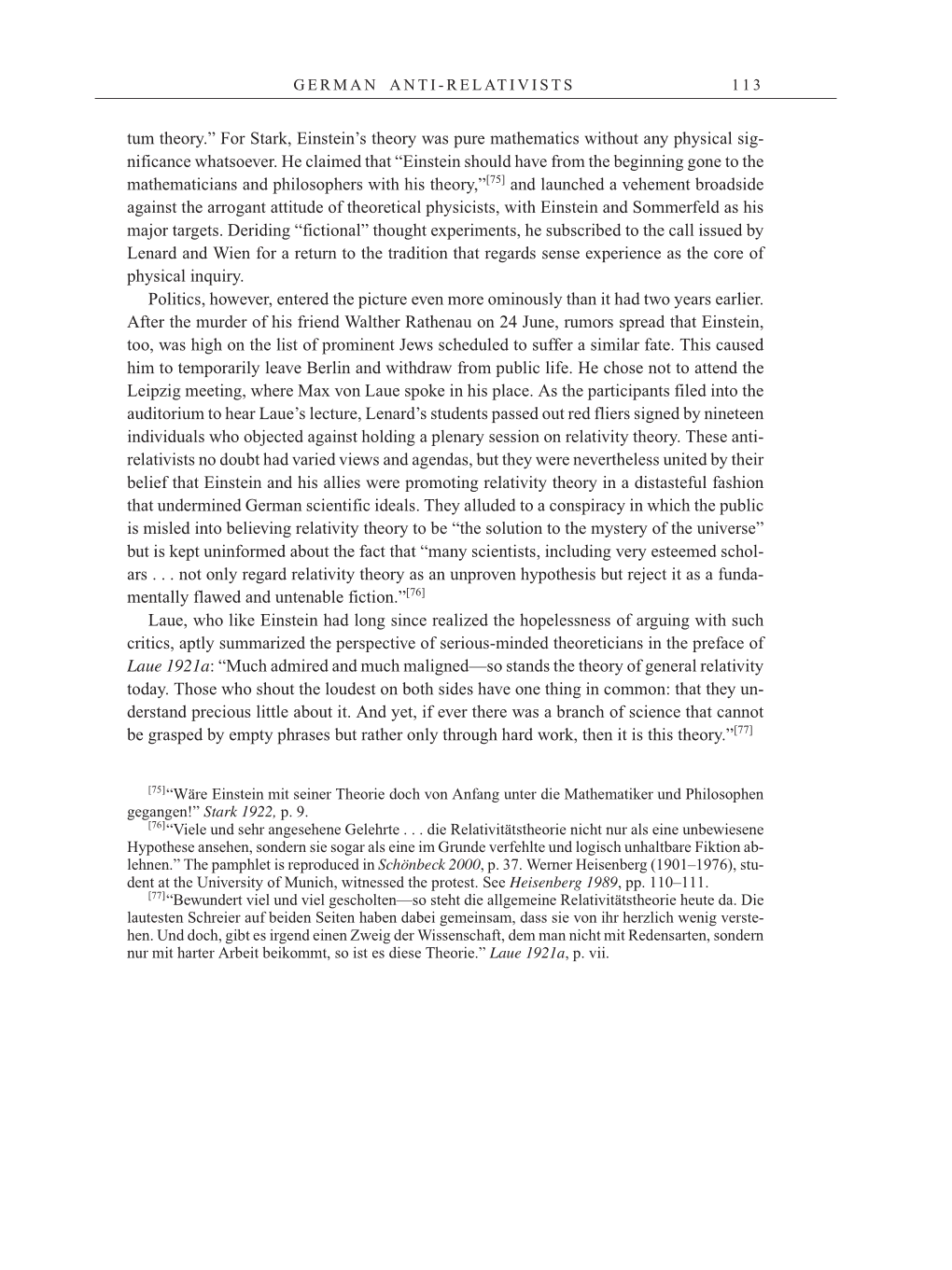G E R M A N A N T I - R E L AT I V I S T S 1 1 3
tum theory.” For Stark, Einstein’s theory was pure mathematics without any physical sig-
nificance whatsoever. He claimed that “Einstein should have from the beginning gone to the
mathematicians and philosophers with his
theory,”[75]
and launched a vehement broadside
against the arrogant attitude of theoretical physicists, with Einstein and Sommerfeld as his
major targets. Deriding “fictional” thought experiments, he subscribed to the call issued by
Lenard and Wien for a return to the tradition that regards sense experience as the core of
physical inquiry.
Politics, however, entered the picture even more ominously than it had two years earlier.
After the murder of his friend Walther Rathenau on 24 June, rumors spread that Einstein,
too, was high on the list of prominent Jews scheduled to suffer a similar fate. This caused
him to temporarily leave Berlin and withdraw from public life. He chose not to attend the
Leipzig meeting, where Max von Laue spoke in his place. As the participants filed into the
auditorium to hear Laue’s lecture, Lenard’s students passed out red fliers signed by nineteen
individuals who objected against holding a plenary session on relativity theory. These anti-
relativists no doubt had varied views and agendas, but they were nevertheless united by their
belief that Einstein and his allies were promoting relativity theory in a distasteful fashion
that undermined German scientific ideals. They alluded to a conspiracy in which the public
is misled into believing relativity theory to be “the solution to the mystery of the universe”
but is kept uninformed about the fact that “many scientists, including very esteemed schol-
ars . . . not only regard relativity theory as an unproven hypothesis but reject it as a funda-
mentally flawed and untenable
fiction.”[76]
Laue, who like Einstein had long since realized the hopelessness of arguing with such
critics, aptly summarized the perspective of serious-minded theoreticians in the preface of
Laue 1921a: “Much admired and much maligned—so stands the theory of general relativity
today. Those who shout the loudest on both sides have one thing in common: that they un-
derstand precious little about it. And yet, if ever there was a branch of science that cannot
be grasped by empty phrases but rather only through hard work, then it is this
theory.”[77]
[75]“Wäre Einstein mit seiner Theorie doch von Anfang unter die Mathematiker und Philosophen
gegangen!” Stark 1922, p. 9.
[76]“Viele und sehr angesehene Gelehrte . . . die Relativitätstheorie nicht nur als eine unbewiesene
Hypothese ansehen, sondern sie sogar als eine im Grunde verfehlte und logisch unhaltbare Fiktion ab-
lehnen.” The pamphlet is reproduced in Schönbeck 2000, p. 37. Werner Heisenberg (1901–1976), stu-
dent at the University of Munich, witnessed the protest. See Heisenberg 1989, pp. 110–111.
[77]“Bewundert viel und viel gescholten—so steht die allgemeine Relativitätstheorie heute da. Die
lautesten Schreier auf beiden Seiten haben dabei gemeinsam, dass sie von ihr herzlich wenig verste-
hen. Und doch, gibt es irgend einen Zweig der Wissenschaft, dem man nicht mit Redensarten, sondern
nur mit harter Arbeit beikommt, so ist es diese Theorie.” Laue 1921a, p. vii.
